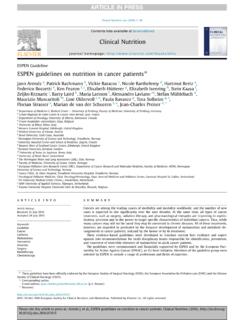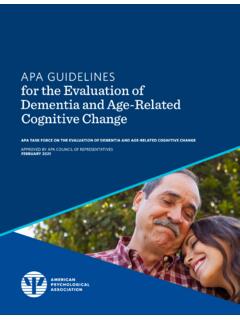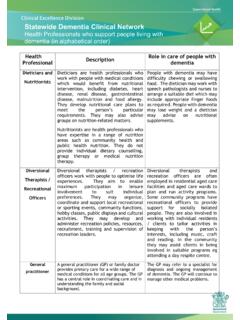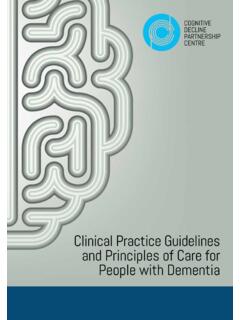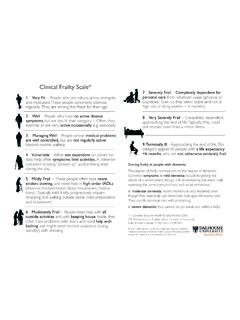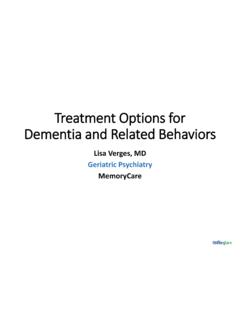Transcription of ESPEN guidelines on nutrition in dementia Volkert 2015
1 E-SPEN guidelineESPEN guidelines on nutrition in dementiaDorothee Volkerta,*, Michael Chourdakisb, Gerd Faxen-Irvingc, Thomas Fr hwaldd,Francesco Landie, Merja H. Suominenf, Maurits Vandewoudeg, Rainer Wirtha,h,St!ephane M. SchneideriaInstitute for Biomedicine of Aging (IBA), Friedrich-Alexander-Universit at (FAU) Erlangen-N rnberg, Nuremberg, GermanybDepartment of Medicine, Aristotle University of Thessaloniki (AUTH), GreececDivision of clinical Geriatrics, Department of Neurobiology, Care Sciences and Society, Karolinska Institutet, Stockholm, SwedendDepartment of Geriatric Acute Care, Krankenhaus Hietzing, Vienna, AustriaeDepartment of Geriatrics, Neurosciences and Orthopedics, Catholic University of the Sacred Heart, Rome, ItalyfUnit of Primary Health Care, Helsinki University Central Hospital, Helsinki, FinlandgDepartment of Geriatrics, Medical School, University of Antwerp, BelgiumhSt.
2 Marien-Hospital Borken, Department for Internal Medicine and Geriatrics, Borken, GermanyiNutritional Support Unit, Centre Hospitalier Universitaire de Nice, Nice, Francearticle infoArticle history:Received 20 August 2015 Accepted 10 September 2015 Keywords:GuidelineDementiaMalnutritionNu tritional supportNutritional interventionssummaryBackground:Older people suffering from dementia are at increased risk of malnutrition due to variousnutritional problems, and the question arises which interventions are effective in maintaining adequatenutritional intake and nutritional status in the course of the disease.
3 It is of further interest whethersupplementation of energy and/or specific nutrients is able to prevent further cognitive decline or evencorrect cognitive impairment, and in which situations artificial nutritional support is :It is the purpose of these guidelines to cover these issues with :The guidelines were developed by an international multidisciplinary working group inaccordance with officially accepted standards. The GRADE system was used for assigning strength ofevidence. Recommendations were discussed, submitted to Delphi rounds and accepted in an onlinesurvey among ESPEN :26 recommendations for nutritional care of older persons with dementia are given.
4 In everyperson with dementia , screening for malnutrition and close monitoring of body weight are recom-mended. In all stages of the disease, oral nutrition may be supported by provision of adequate, attractivefood in a pleasant environment, by adequate nursing support and elimination of potential causes ofmalnutrition. Supplementation of single nutrients is not recommended unless there is a sign of defi-ciency. Oral nutritional supplements are recommended to improve nutritional status but not to correctcognitive impairment or prevent cognitive decline. Artificial nutrition is suggested in patients with mildor moderate dementia for a limited period of time to overcome a crisis situation with markedly insuf-ficient oral intake, if low nutritional intake is predominantly caused by a potentially reversible condition,but not in patients with severe dementia or in the terminal phase of :Nutritional care and support should be an integral part of dementia management.
5 In allstages of the disease, the decision for or against nutritional interventions should be made on an indi-vidual basis after carefully balancing expected benefit and potential burden, taking the (assumed) patientwill and general prognosis into account. 2015 Elsevier Ltd and European Society for clinical nutrition and Metabolism. All rights :AD, Alzheimer's disease; APOE, apolipoprotein E-e4 allele; DHA, docosahexaenoic acid; EPA, eicosapentaenoic acid; MCI, mild cognitive impairment; MNA,mini nutritional assessment; MNA-SF, mini nutritional assessment short form; MMSE, mini mental state examination; RCT, randomized controlled trial.
6 *Corresponding author. Institute for Biomedicine of Aging (IBA), Friedrich-Alexander-Universit at (FAU) Erlangen-N rnberg, Kobergerstra e 60, 90408 N rnberg, : 49 911 5302 Volkert ).Contents lists available atScienceDirectClinical Nutritionjournal homepage: 2015 Elsevier Ltd and European Society for clinical nutrition and Metabolism. All rights nutrition xxx (2015) 1e22 Please cite this article in press as: Volkert D, et al., ESPEN guidelines on nutrition in dementia , clinical nutrition (2015), Development of guidelines on nutrition in dementiaThe European Society for clinical nutrition and Metabolism( ESPEN ) launched a process of developing guidelines on nutritioncare for patients with dementia .
7 The group included physicians,nutritionists and dietitians with a background in geriatrics, nutri-tion and/or ethics, all experienced in treatment and nutritionaltherapy of persons with dementia , as well as the guidelines coor-dinator (SMS); all are authors of this guideline experts followed the GRADE method, which was based ondeterminations ofgrade of evidenceandstrength of recommenda-tion; the methodology is described elsewhere[1]. A two-day livemeeting was organized in Biedenkopf, Germany, in April of 2014,and three phone conferences were that did not lead to specific recommenda-tions are grouped in afirst part (general considerations), whereasall questions that led to comparisons of interventions and to rec-ommendations are grouped in a second part (recommendations).
8 A systematic literature search was conducted in PubMed and theCochrane Library. Thegrade of evidence(GOE) was determined by anumber of factors, starting with the number and type of researchstudies[2]. Grading fromHightoVery Lowwas used to rate thequality of the underlying evidence and the level of certainty foreffect (Table 1)[3]. Highest quality evidence resulted from consis-tent results or meta-analysis of multiple randomized controlledtrials, with the next highest level defined by at least one well-designed randomized controlled trial. Moderate and low-level ev-idence came from controlled trials that were not randomized, fromcohort- or case-controlled studies, or from multiple time seriestrials.
9 Very low-level evidence was from expert clinical experienceor from descriptive studies. The grade was then decreased if therewere limitations to study quality, inconsistencies infindings,imprecise or sparse data, or high likelihood of reporting bias. Thegrade was increased if there was high consistency offindings orstrong evidence of association (Table 1).Thestrength of recommendationwas based on a consensus dis-cussion, which included expression and deliberation of expertopinions, risk-benefit ratio of recommendation, costs, and a reviewof supportive evidence, followed by Delphi rounds and votes untilagreement was reached (Table 2).
10 Last, a list of all statements was sent to all 2611 ESPEN memberswith an e-mail address onfile to ask for approval/disapproval ofevery statement, and in the latter case to provide justification. 86 ESPEN members completed the survey, with approval ratingsranging from 70% to 93%. Comments based on the literature weretaken into account in thefinal version of the General Definition of dementiaDementia is on the rise in our aging societies, not only in Europeand North America but worldwide. dementia becomes more andmore common, but it is not normal healthy aging and it is notbenign.



